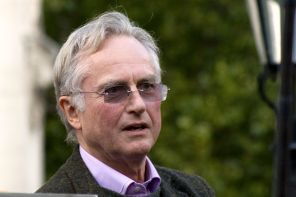As readers of RD already know from earlier articles, the Council for Secular Humanism held its 30th anniversary annual meeting last week in Los Angeles. For the event, entitled Setting the Agenda: Secular Humanism’s Next 30 Years, the humanist community assembled many of its leading lights, including Sam Harris, Robert Wright, Paul Kurtz, Lawrence Krauss, PZ Myers, and Chris Mooney. Even among such demigods of modern atheism, Friday night’s banquet speaker, Richard Dawkins, attracted the most attention among the nearly 400 humanists at the event.
I attended both Dawkins’ talk and the pre-banquet reception as a guest of the conference’s local host, the engaging and engaged Center for Inquiry. Mingling with conference participants at the reception, the anticipation of Dawkins’ appearance was palpable. Many commented to me about how thrilled they were to hear him. Some said they came to conference—a number of them from quite far away—primarily because Dawkins was going to speak. It was something akin to the excitement that I once noted among participants at an evangelical conclave before a sermon by Billy Graham. An appearance by the Pope must arouse similar feelings among Catholics. Too bad secular humanists don’t do healings or alter calls because it was the type of atmosphere that could excite a response.
A secular humanist convention is not the witches’ coven that some sheltered theists might expect. I did not see anyone smoking and never heard a profane word. Drinking at the reception was modest by anyone but a teetotaler’s standards, and far less than at the Episcopal fundraiser I’d attended the previous week. Also unlike the Episcopal affair, I did not spot a single same-sex couple. I began to wonder how much fun these people, freed from religion’s rules, were having with their liberty. But there was quite a bit of rational discourse about politics, which I enjoyed, and not everyone was blaming our beleaguered president for the state of the economy. It is an older crowd—not so old as the Episcopalians, mind you, but hardly what I’ve seen at creationist meetings, which seem to include lots of homeschooling moms.
The banquet was served cafeteria style on two long tables somewhat like a church potluck, though the food was all catered and it did not include any casseroles. The secular humanists lined up like Lutherans for the food and heaped their plates with overlapping mounds of meat, starch and vegetables like Baptists. Some of them must have had church backgrounds, however, because more than a few headed straight for the dessert table and only returned for the main course after caching their sweets back at their seats. Clearly I have not been to enough such potlucks because by the time I got to the dessert table, most of the pies and cakes were gone and the wait staff had resupplied the selection with items apparently left over from breakfast. A dab of whipped cream does not turn a blueberry muffin into a dessert.
Before speaking, Dawkins received the first (and apparently last) Robert Creggs Prize for furthering rational thought from a secular humanist perspective. The amount of the prize was not announced in advance but some of the pre-banquet chatter led me to believe that it might rival the Templeton Prize for advancing religion, which Dawkins has lambasted in the past. Sadly, the money totaled only $45,225.09, which pales in comparison to the Templeton’s million-pound award. Nevertheless, Dawkins seemed genuinely pleased to accept it on behalf of his foundation. The crowd roared its approval. Everyone appeared to agree with the pick for this one-time prize. In making the award the moderator said that the choice was obvious.
Speaking to the converted, Dawkins used the occasion to comment on how he deals with theists. Noting that he is often accused of abusing creationists, for example, Dawkins stressed that he calls their ideas stupid, not them. Individual creationists may simply be ignorant, insincere, or insane, he conceded, with the generous air of a Victorian aristocrat commenting on the mob storming his place. Dawkins’ list does not exhaust the possibilities; creationists could also be indoctrinated or ideological, just to mention a few more options beginning with “I”. Indeed, I find that most creationists accept creationism because they think their religious beliefs demand it.
Creationism is part of a package that is attractive to them for reasons that have nothing to do with science. Dawkins’ approach may please secular humanists—it clearly pleased this crowd in Los Angeles—without making much headway in converting creationists. To tell anyone who identifies with an idea that her ideas are stupid is tantamount to calling her stupid no matter what gloss Dawkins wants to put on it.
Still, he had this audience eating out of the palm of his hand. I was hoping for a reasoned presentation of his theories and their impact, such as about his enormously influential concept of the selfish gene, which does so much to explain behavior. But this was not the night for a science lecture. He used his platform to offer advice and encouragement to secular humanists. Dawkins could have spoken for twice as long without wearing out his welcome and, when he finished, scores rushed the rostrum carrying cameras to document the moment. He posed with them graciously.




